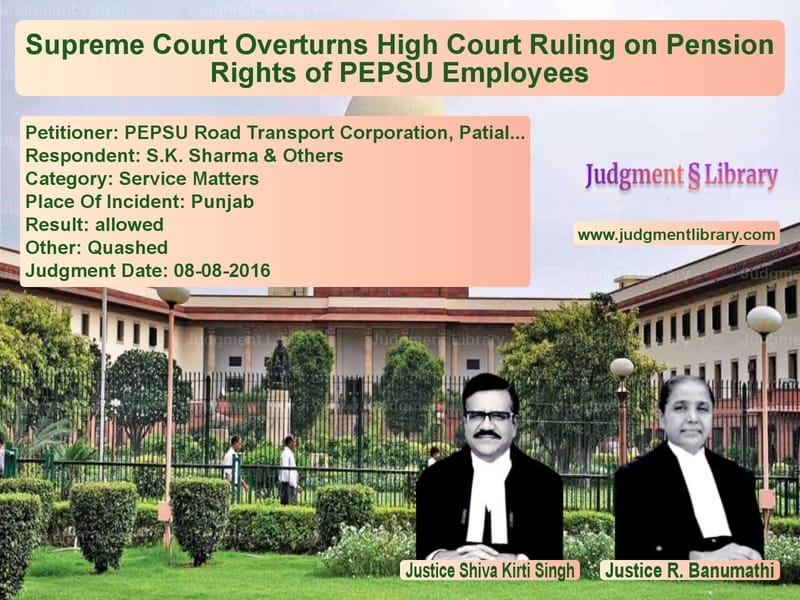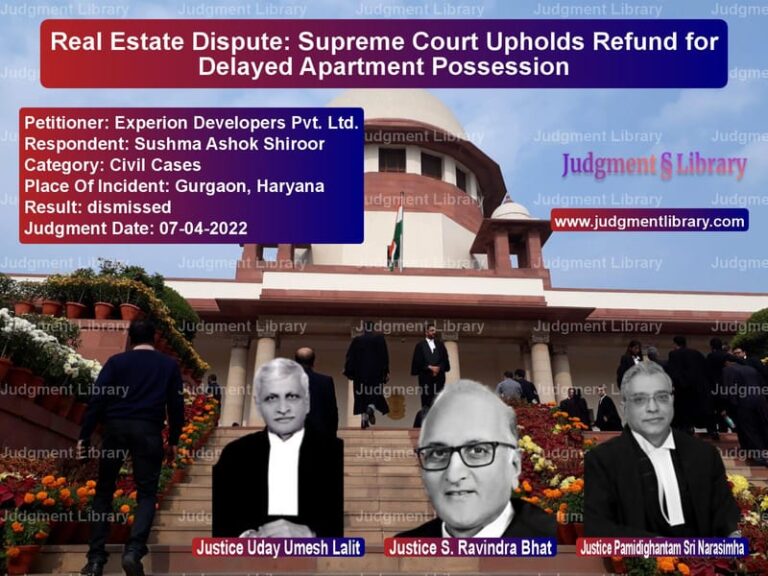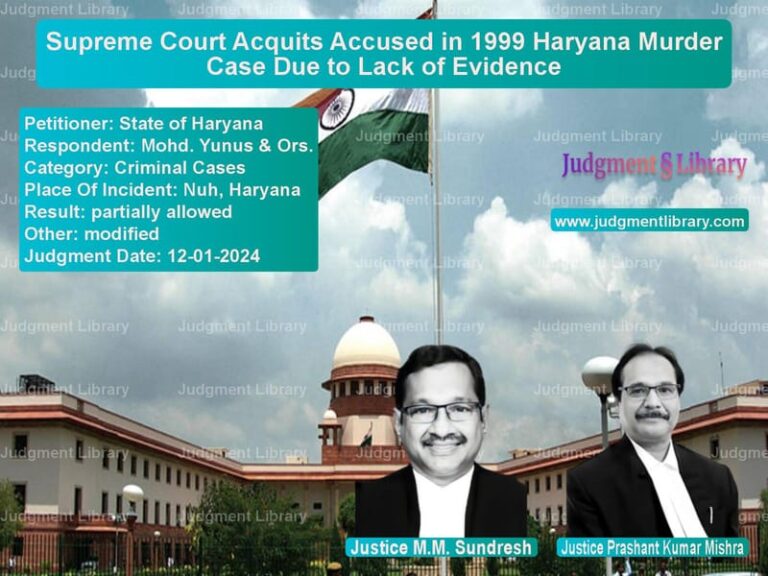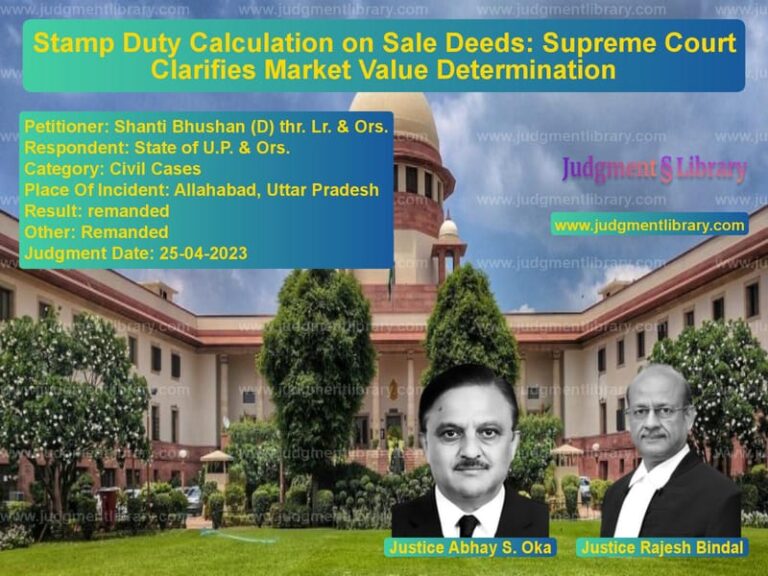Supreme Court Overturns High Court Ruling on Pension Rights of PEPSU Employees
The case of PEPSU Road Transport Corporation, Patiala v. S.K. Sharma & Others revolved around the pensionary rights of employees who were initially part of PEPSU Roadways but later merged into the PEPSU Road Transport Corporation (PRTC). The Supreme Court, in its judgment dated August 8, 2016, ruled that these employees were not entitled to government pensions since they had accepted employment under the Corporation and received contributory provident fund (CPF) benefits.
Background of the Case
The respondents, including S.K. Sharma, were originally appointed as temporary employees in PEPSU Roadways between January 1955 and September 1956. The Roadways department ceased to exist after being merged with the newly formed PEPSU Road Transport Corporation (PRTC) on October 16, 1956. The employees were transferred to the Corporation, and their service conditions were governed by the Corporation’s regulations, which initially provided for Contributory Provident Fund (CPF) but no pension.
Years after their retirement (between 1989 and 1991), the employees filed a writ petition seeking pensionary benefits. They argued that they should be considered government employees entitled to pensions because there was no explicit absorption order transferring them to PRTC. The Punjab and Haryana High Court ruled in their favor, prompting an appeal by the Corporation.
Legal Issues
The Supreme Court examined the following issues:
- Whether the employees continued to be government servants after PEPSU Roadways merged with PRTC.
- Whether the absence of an explicit absorption order affected their employment status.
- Whether they were entitled to pension benefits despite receiving CPF payments.
- Whether the High Court was correct in ignoring the long delay in raising their claims.
Petitioner’s Arguments (PEPSU Road Transport Corporation)
The Corporation argued:
- The employees ceased to be government servants when PEPSU Roadways merged with the Corporation in 1956.
- The respondents accepted employment with the Corporation, were promoted, and retired under its service conditions.
- They had accepted CPF and gratuity payments without protest, which precluded them from claiming pensions decades later.
- Their claims should have been barred due to inordinate delay.
Respondent’s Arguments (S.K. Sharma & Others)
The employees contended:
- The absence of explicit absorption orders meant they remained government employees.
- They should have been given the option to choose between CPF and pension.
- Since PEPSU State merged with Punjab on November 1, 1956, they should have been considered Punjab government employees.
- The principle of beneficial interpretation should apply, ensuring they receive pensions.
Supreme Court’s Observations and Ruling
1. Employees Were Absorbed into the Corporation
The Court ruled that the employees had been effectively absorbed into PRTC:
“The transfer of PEPSU Roadways to the Corporation was a complete merger of the department, including all assets, liabilities, and employees. The respondents were absorbed by default and accepted their new employment without protest.”
Since there was no challenge to the merger in 1956, the employees could not claim decades later that they remained government servants.
2. Acceptance of CPF Benefits Precludes Pension Claims
The Court emphasized that the respondents had accepted CPF and gratuity payments:
“The respondents received retiral benefits under the Corporation’s regulations and never protested at the time of retirement. There was no residual legal relationship between them and the government.”
Since CPF payments were a full and final settlement, their pension claims were legally untenable.
3. Long Delay in Filing Claims
The Court held that the employees had waited too long to challenge their status:
“The High Court erred in entertaining the writ petition decades after retirement. Such belated claims should have been dismissed outright.”
The delay of nearly four decades after their initial transfer was unreasonable and further weakened their claims.
4. Incorrect Application of States Reorganization Act
The Court rejected the argument that the employees should be treated as Punjab government servants post-merger:
“The respondents ceased to be PEPSU State employees before the merger with Punjab. The provisions of the States Reorganization Act had no relevance to their employment status.”
Since they had already joined the Corporation before November 1, 1956, they could not claim state government pensions.
Final Verdict
The Supreme Court allowed the appeal and ruled:
- The High Court’s decision granting pension benefits was set aside.
- The employees’ claims were dismissed as they had accepted CPF and gratuity benefits.
- The long delay in filing claims was unreasonable and barred their petition.
- The PEPSU Road Transport Corporation was not liable to provide pensions to the respondents.
Key Takeaways
- The Supreme Court reaffirmed that employees who accept CPF benefits cannot later claim pensions.
- Mergers of government departments with corporations result in automatic absorption unless explicitly challenged.
- Courts should not entertain delayed claims that arise decades after the relevant employment actions.
- The States Reorganization Act does not apply when employees have already transferred to a new entity.
Impact of the Judgment
The ruling had significant implications for employment law and pension rights:
- It prevented employees from making retrospective claims for pensions after accepting other benefits.
- It reinforced the importance of timely legal challenges to employment transfers.
- It clarified that corporate employment rules prevail once a merger occurs.
- It provided legal certainty for public sector corporations handling pension claims.
In conclusion, the Supreme Court’s decision in PEPSU Road Transport Corporation v. S.K. Sharma reaffirmed the principle that employees must adhere to the service conditions they accepted during their employment. The ruling ensured that past employment agreements remain enforceable and cannot be reinterpreted after decades to claim additional benefits.
Don’t miss out on the full details! Download the complete judgment in PDF format below and gain valuable insights instantly!
Download Judgment: PEPSU Road Transport vs S.K. Sharma & Others Supreme Court of India Judgment Dated 08-08-2016-1741878454361.pdf
Direct Downlaod Judgment: Direct downlaod this Judgment
See all petitions in Pension and Gratuity
See all petitions in Judgment by Shiva Kirti Singh
See all petitions in Judgment by R. Banumathi
See all petitions in allowed
See all petitions in Quashed
See all petitions in supreme court of India judgments August 2016
See all petitions in 2016 judgments
See all posts in Service Matters Category
See all allowed petitions in Service Matters Category
See all Dismissed petitions in Service Matters Category
See all partially allowed petitions in Service Matters Category







